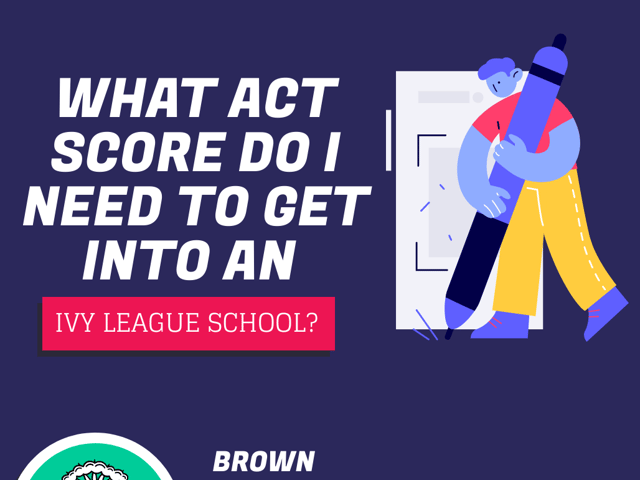
What ACT Score do I Need to get into an Ivy League School?
According to ACT.org, the average ACT score in 2019, 2020, and 2021 was around 21. If you score over a 21, that puts you above average! But is scoring a 21 on the ACT good enough to get you into an Ivy League school?
Each year, thousands of hopefuls apply to their dream schools. Unfortunately, the majority of these students will receive a rejection letter. Scoring high on the ACT is a way to ensure you are not one of them.
Now, ACT scores are not everything when it comes to Ivy League admissions. But test scores can show your readiness for the rigorous academic expectations of the country’s top schools.
What ACT score should you shoot for if you want to get into an Ivy League school? We are answering this question and many more in this guide, so keep reading for all the facts you need to know!
What Is an Ivy League School?
The Ivy League is a collection of super-elite private schools providing some of the best collegiate-level education in the country, if not the world. These schools share in common their age, prestige, and world-renown.
But did you know that the term “Ivy League” originated to describe an athletic conference? Many people wonder why top-notch schools like Stanford and MIT are not considered Ivy League schools. The simple reason is that these schools are not part of the Ivy League athletic conference.
Now, that is not to say that Stanford, MIT, and other non-Ivy Leagues are not good schools– quite the opposite. But for the purposes of this article, we will be talking about schools in the Ivy League athletic conference.
So, which schools are part of the Ivy League? We are talking about all eight of them next.
Brown University
Located in the heart of Providence, Rhode Island, Brown stands out with its unique “Open Curriculum,” which allows students to craft their own academic path without being restricted by general education requirements. Known for fostering an environment of independence and creativity, Brown has produced numerous leaders and innovators across multiple fields.
Columbia University
Nestled within the bustling metropolis of New York City, Columbia offers students a unique blend of rigorous academics and vibrant city life. With a history that dates back to pre-Revolutionary America, it boasts alumni like Alexander Hamilton and Barack Obama. Its core curriculum, designed to develop critical thinkers, is renowned worldwide.
Cornell University
Another Ivy League school that calls the state of New York home is Cornell University. This university is south of Syracuse, NY, in the city of Ithica. Cornell is unique in that it has seven colleges, each of which has its own admission standards.
Dartmouth College
Dartmouth, located in the picturesque town of Hanover, New Hampshire, prides itself on its commitment to undergraduate education. Despite its smaller size compared to other Ivies, Dartmouth has a robust Greek life and offers a unique “D-Plan” system that provides flexibility in determining students’ academic schedules.
Harvard University
Arguably the most recognizable name in higher education, Harvard sets the gold standard. Located in Cambridge, its extensive library system, diverse academic programs, and legacy of producing global leaders make it an academic powerhouse. Its notable alumni roster includes numerous U.S. presidents and influential figures in every conceivable field.
Princeton University
Princeton, situated in the charming town of Princeton, New Jersey, is known for its close-knit undergraduate community, strong emphasis on research, and a long-standing honor code. Its distinctive “eating clubs” provide both social and dining forums for upperclassmen.
University of Pennsylvania
Commonly known as Penn, this Philadelphia-based Ivy is renowned for its Wharton School of Business, one of the premier business schools globally. Founded by Benjamin Franklin, Penn’s ethos revolves around interdisciplinary learning, merging the practical and theoretical to produce well-rounded graduates.
Yale University
Located in New Haven, Connecticut, Yale is steeped in tradition and history. From its secret societies to the residential college system, Yale offers a unique student experience. Its law school is particularly esteemed, and its library, with its iconic reading room, is a source of inspiration for scholars globally.
What ACT Score Do You Need to Get Into Ivy League Schools?
Every Ivy League is different when it comes to ACT testing scores. Some universities weigh ACT scores higher than others. And some universities will accept lower ACT scores than others.
Another thing to understand is that most Ivy League schools do not have test score minimums. In other words, their websites and admissions materials do not state a minimum score you need to apply.
We will talk more about the other admissions criteria schools look at aside from ACT scores in a moment. But first, let’s talk about the average ACT scores at the eight Ivy League schools we listed above.
As a reminder, the highest ACT score you can get is a 36.
Average ACT Scores at Brown
Brown is an ACT/SAT test-optional school. That means you do not have to submit standardized testing scores to apply. Only 2% of Brown students scored below a 29 on the ACT, while 60% of students scored a 35 or 36. The average ACT score for a Brown student is between 34 and 36.
Average ACT Scores at Columbia
ACT and SAT scores have been optional at Columbia since the COVID-19 pandemic. For the class of 2025, the ACT score range for the 50th percentile of students was 34 to 35.
Average ACT Scores at Cornell
Cornell has suspended all ACT and SAT testing requirements. Subsequently, the university has suspended the use of test scores for admissions for 2022, 2023, and 2024.
For Cornell’s class of 2022, the bottom 25% of admitted students scored a 32 or lower on the ACT. The top 25% of students scored a 34 or higher. And the middle 50th percentile got an average ACT score of 33.
Average ACT Scores at Dartmouth
Dartmouth’s class of 2025 saw an average middle 50th percentile SAT score of 32–35. That means the top 25% got the highest score possible on the ACT: a 36. The bottom 25th percentile would probably average a score of 31 or lower.
Average ACT Scores at Harvard
Harvard has suspended the SAT/ACT requirement for incoming students. The classes of 2027–2030 will not have to submit testing scores as a requirement for admissions.
This university does not publish ACT test score statistics, but the typical ACT score of an incoming Harvard student ranges between 33–35.
Average ACT Scores at Princeton
At Princeton, the middle 50th percentile of admitted students got a composite score of 33 to 35 on the ACT. Testing scores are optional when you apply to Princeton in 2022, however, you might still want to take the ACT or SAT to stand out.
Average ACT Scores at Penn
Submitting ACT/SAT test scores at the University of Pennsylvania is optional for the 2023 admissions cycle. According to stats about the incoming Penn class of 2026, the average ACT score was 34–36.
Average ACT Scores at Yale
ACT scores are optional at Yale for students applying in 2022 and 2023. The middle 50% of Yale students scored between 33 and 35 on the ACT. The school explicitly encourages students to apply even if their scores are below this average.

Other Factors Ivy League Schools Consider
The acceptance rate at Ivy League schools is typically below 10%, making these schools some of the most selective in the nation.
If you want to get into one of the Ivy League schools, you should shoot for an ACT score of 31–35. This would align you with the 50th percentile of students at the majority of these schools.
However, just because you score well on the ACT/SAT does not mean you will automatically get into your dream school.
Ivy League schools tend to use a holistic approach to admissions. That means admissions boards will also consider the following.
Extracurriculars
Extracurricular activities serve as a window into a student’s passions, commitments, and leadership potential. For Ivy League admissions, it’s not just about participation; it’s about the depth of involvement, consistent dedication, and alignment with academic and career aspirations.
-
Depth and Leadership: While depth of experience in extracurricular activities is significant, so is taking on leadership roles within these activities. Being a club president, team captain, or lead organizer of an event showcases dedication, responsibility, and the ability to inspire and manage peers.
-
Consistency: It’s not just about showing depth in a year or two; consistency over time is vital. If you’ve been a part of a particular activity or club since your freshman year, it demonstrates commitment and passion for that endeavor.
-
Aligning with Future Goals: Ivy League schools appreciate when your extracurriculars align with your intended major or future career plans. For instance, if you aim to study biomedical engineering and have spent years in a robotics club, it shows a clear trajectory and genuine interest in your field.
GPA
A good high school GPA is indicative of a student who is prepared to succeed at an Ivy League school. The average student at most Ivy League schools has a GPA of 3.9 or higher on a 5-point scale.
It’s a great idea to take some Advanced Placement (AP) courses. Getting good grades in AP classes can help boost your GPA. Most schools apply a 10-point multiplier when factoring AP courses into your final GPA.
Early Application
The majority of students accepted into Ivy League schools are early applicants. Why? Students can only apply early to one school, making it very clear where their preference lies.
If the rest of your admissions package is weaker, applying early can help improve your chances of getting accepted to the school you really want to attend.
Statement of Purpose
Your statement of purpose is more than just an essay; it’s a reflection of who you are and why you aspire to attend a specific institution. It provides the admissions committee a deeper understanding of your journey, dreams, and the unique attributes you’d bring to their campus. As you write your statement of purpose, keep in the mind the following:
-
Authenticity: It’s crucial that your statement is authentically yours. Admissions officers read thousands of essays, and they can discern between genuine stories and ones crafted just to impress.
-
Narrative Arc: A great statement of purpose will have a clear narrative arc. Begin with an anecdote or a personal story, delve into how it shaped your goals or perspectives, and conclude by connecting it to why you want to attend that specific Ivy League institution.
-
Beyond Academics: Your statement is an opportunity to share aspects of yourself that aren’t evident in your grades or test scores. Discuss personal challenges, family experiences, or cultural backgrounds that have influenced your world view.
-
Why This School?: Be specific about why you want to attend this particular school within the Ivy League. Mention specific programs, professors, or opportunities that align with your goals. Demonstrating that you’ve researched and understand what the school offers can make your statement stand out.
Union Test Prep Can Help You Get Into the Ivy League School of Your Dreams!
If you want to get into an Ivy League school, you need an ACT score of 31–32 or higher. Many schools make testing score submission optional, but submitting a good score can set you apart from the stack. Do you need help studying for the ACT? We want to help you get into the school of your dreams — at no cost to you. Sign up for our free ACT study guides, practice tests, and more today!
Keep Reading

ACT Blog
How to Do Well on the ACT Essay
Understanding the ACT Essay Before diving into strategies to excel, it…

ACT Blog
Essay Writing Practice and Prompts for the ACT
The ACT writing test is an optional exam, and is not always given as pa…

ACT Blog
How to Study for the ACT in One Week
Getting ready for American College Testing (the ACT) can be a source of…